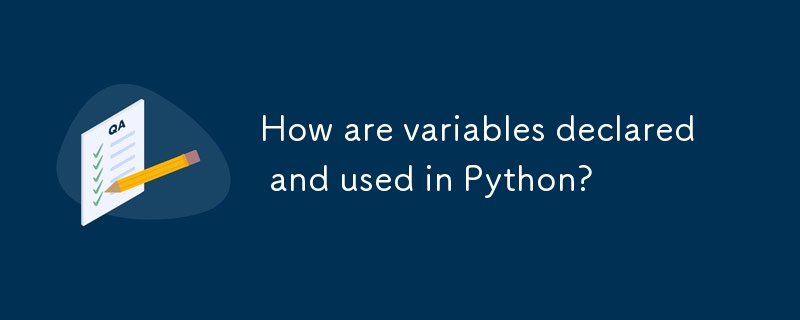

Variable Declaration in Python: A Comprehensive Explanation
Introduction
The concept of variable declaration differs significantly in Python compared to strongly typed languages. This article aims to clarify how variables are defined and used in Python.
Understanding Variable 'Declaration' in Python
In Python, there is no explicit concept of "variable declaration." Rather, variables are created through assignment. When a value is assigned to a name, that name becomes a reference to the value. For example:
<code class="python">my_name = "John Smith"</code>
Here, the name my_name is assigned to the string value "John Smith." This means that any operation or function that references my_name will access the value "John Smith."
Object Initialization Using __init__
In Python, classes can have an __init__ method, which is automatically called when an instance of the class is created. The purpose of __init__ is to initialize the instance's attributes. For example:
<code class="python">class Person:
def __init__(self, name):
self.name = name</code>When an instance of Person is created, the __init__ method is called with the desired name as an argument. This initializes the instance's name attribute.
Assigning to Object Attributes
Once an object is created, its attributes can be modified through assignment. For example:
<code class="python">person1 = Person("Sarah")
person1.name = "Sarah Jones"</code>In this example, the name attribute of person1 is initially set to "Sarah" by the __init__ method. However, we can assign a new value to the attribute using regular assignment, effectively modifying the value associated with the attribute.
Creating Variables to Hold Custom Types
In Python, variables can refer to objects of any type, including custom types defined using classes. To create a variable to hold a custom type, simply assign an instance of that type to the variable. For example:
<code class="python">class Writer:
def __init__(self, path):
self.path = path
writer1 = Writer("/path/to/file.txt")</code>Here, writer1 is a variable that holds an instance of the Writer class. The path attribute of writer1 is initialized to the specified file path.
Conclusion
In Python, variable declaration is simply the process of assigning values to names. There is no explicit declaration syntax, and variables can be created to hold values of any type. Object initialization is typically handled through __init__ methods, and object attributes can be modified through assignment.
The above is the detailed content of How are variables declared and used in Python?. For more information, please follow other related articles on the PHP Chinese website!




